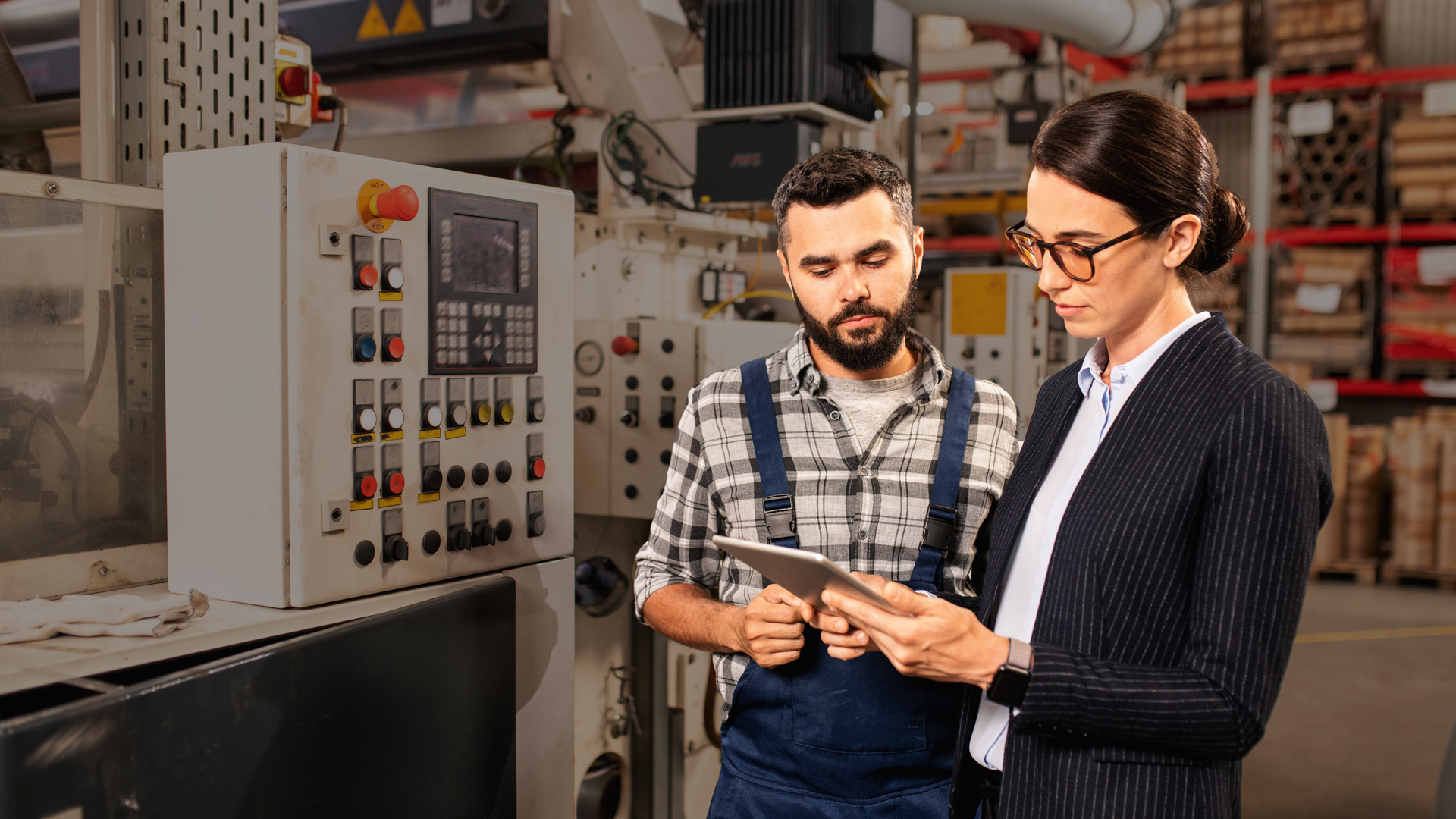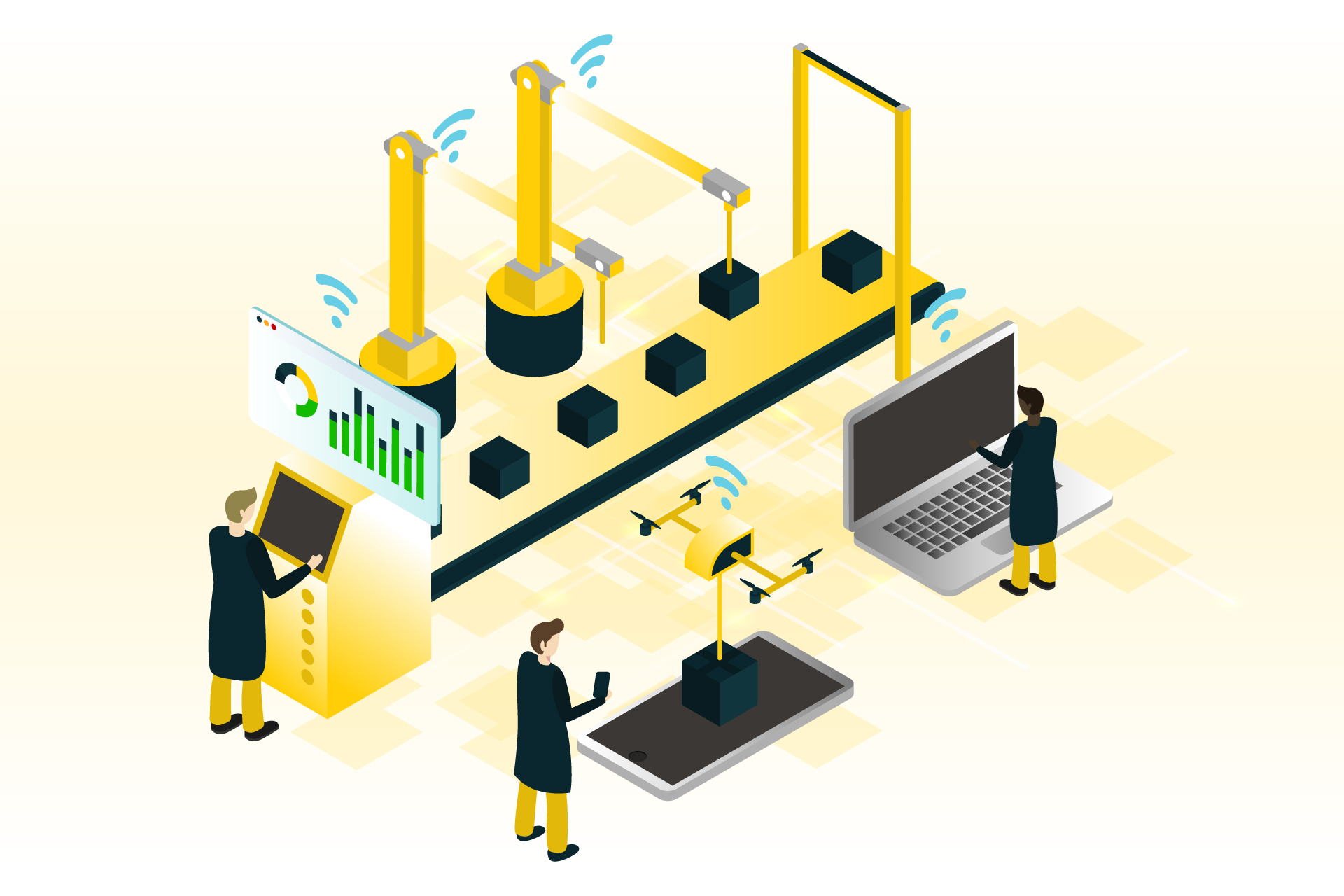
If you’re familiar with the innovation and digital disruption driven by Dassault Systemes, you may already have heard of Factory of the Future or the Industrial Renaissance.
No? Well, you may have heard of their predecessors. Concepts such as Smart Manufacturing, Industrial IoT or Industry 4.0.
In this post we’re going to dive in and uncover everything you need to know in order to understand exactly what the Factory of the Future is and what your manufacturing business can do to start working towards it.
Defining the Factory of the Future
The Factory of the Future is the latest evolution in manufacturing.
It’s characterised by the application of information and communication technologies to manufacturing, and it has the potential to deliver incredible advances in factory environments.
It’s about creating a network, through which systems, processes and people can all remain connected and by connecting these elements you are able to create a smart factory and essentially digitise the manufacturing environment.
Without these smart systems, and access to real-time data, it’s not uncommon for businesses to only learn about issues in workflows, or faults producing rejected parts until well after it’s already happened.
This digitisation means that you have the power to get the right information, to the right people at the right time and machines can begin to predict failures and trigger automated maintenance processes, boosting the efficiency of your factory.
Not only does this give a factory the power to become more efficient, more sustainable and more proactive, but it also has the power to change the way in which people work.

Factory of the Future: a step beyond Industry 4.0
The factory of the future (and the Industrial Renaissance) takes manufacturers a step beyond Industry 4.0.
Industry 4.5 in effect. A step towards Industry 5.0.
Let’s take a look at the evolution of manufacturing, from the 18th century and Industry 1.0, through to Industry 4.0.
Industry 4.0 is the fourth step in the industrial revolution, as factories modernised their working methods to meet the growing demands of the current day.
In order to see why Industry 4.0 is the next logical step in the manufacturing evolution, we feel it’s important to understand where we’ve come from throughout the previous levels of industry.
We’ve hand-picked some of the key points from Desoutter to give an overview of the transition:
- Industry 1.0 | 18th Century
The use of steam power and the mechanisation of production. The systems which produced threads on manually operated spinning wheels, were now being mechanised to produce 8x the volume of thread in the same amount of time.
- Industry 2.0 | 19th Century
The use of electricity and assembly line production. Where a single station would assemble an entire automobile, vehicles were now being produced in partial steps on a conveyor belt, significantly quicker and at a much lower cost. - Industry 3.0 | 20th Century
The use of partial automation and using memory-programmable controls and computers. Since the introduction of these technologies we are now able to automate an entire production process using robotic elements that perform programmed sequences without any human intervention. - Industry 4.0 | 21st Century
The use of smart machinery and automation, connecting all systems together and having the ability to output information about themselves. These allow production systems, components and people to connect via a network and production is nearly autonomous.

As you can see from the above, Industry 4.0 is the concept of having a digitised manufacturing operation allowing people from different areas to remain connected and have access to the information they need, exactly when they need it, as well as using automated process in place that are able to react to real-time events as they happen on the shop floor.
The world of work is constantly changing, and this has only been accelerated by the COVID-19 pandemic throughout 2020 & 2021 where employers had their hands forced to adapt with an entire workforce being homebound for lengthy periods of time.
This is why it’s incredibly important, if you’re not already, to start making steps towards your factory of the future, digitising the manufacturing environment and creating a network that connects your people, processes and systems to allow greater flexibility for your workforce whilst simultaneously boosting productivity of your manufacturing operation.
Working towards the Factory of the Future
In order to start working towards the Factory of the Future, or industry 4.0, as a goal for your business, it’s absolutely essential that you have the right Manufacturing Enterprise Resource Planning (ERP) and Manufacturing Execution System (MES) in place.
Innovative manufacturers worldwide are turning to solutions such as DELMIAWorks to join up all the moving parts of their manufacturing operations in order to boost productivity, reduce the number of rejects, and increase their capacity, allowing the business to produce more goods or parts in the same amount of time, become more efficient and experience exponential growth.
DELMIAWorks’ intelligent software allows a seamless connection between the shop floor and the top floor, with data from machines and processes being generated in the factory and passed onto the decision making executives in real-time.
The Factory of the Future is characterised by the application of information and communication technologies to manufacturing, and it has the potential to deliver incredible advances in factory environments.
Without these smart systems, and access to real-time data, it’s not uncommon for businesses to only learn about issues in workflows, or faults producing rejected parts until well after it’s already happened and by this point it’s too late to fix them.
With DELMIAWorks, you can use the real-time data to predict any problems in advance, and then proactively make adjustments to material quantities, processes and workflows in order to prevent the problem before it occurs.
On top of that, any issues or problems that do arise can be logged in the system and then used to provide immediate feedback on what implications this will have for the rest of your production schedule, giving you the power to provide superior customer service and advise clients of any delays, as they become apparent.
Learn more about how DELMIAWorks could help your business work towards the Factory of the Future
DELMIAWorks ERP and MES software specialises in providing manufacturers with the data and insights they need to be able to make informed decisions about their business.
Learn more about what DELMIAWorks can do to support your business in working towards Factory of the Future today.
Learn More >>
Posted by Rob on 4th November 2021.

